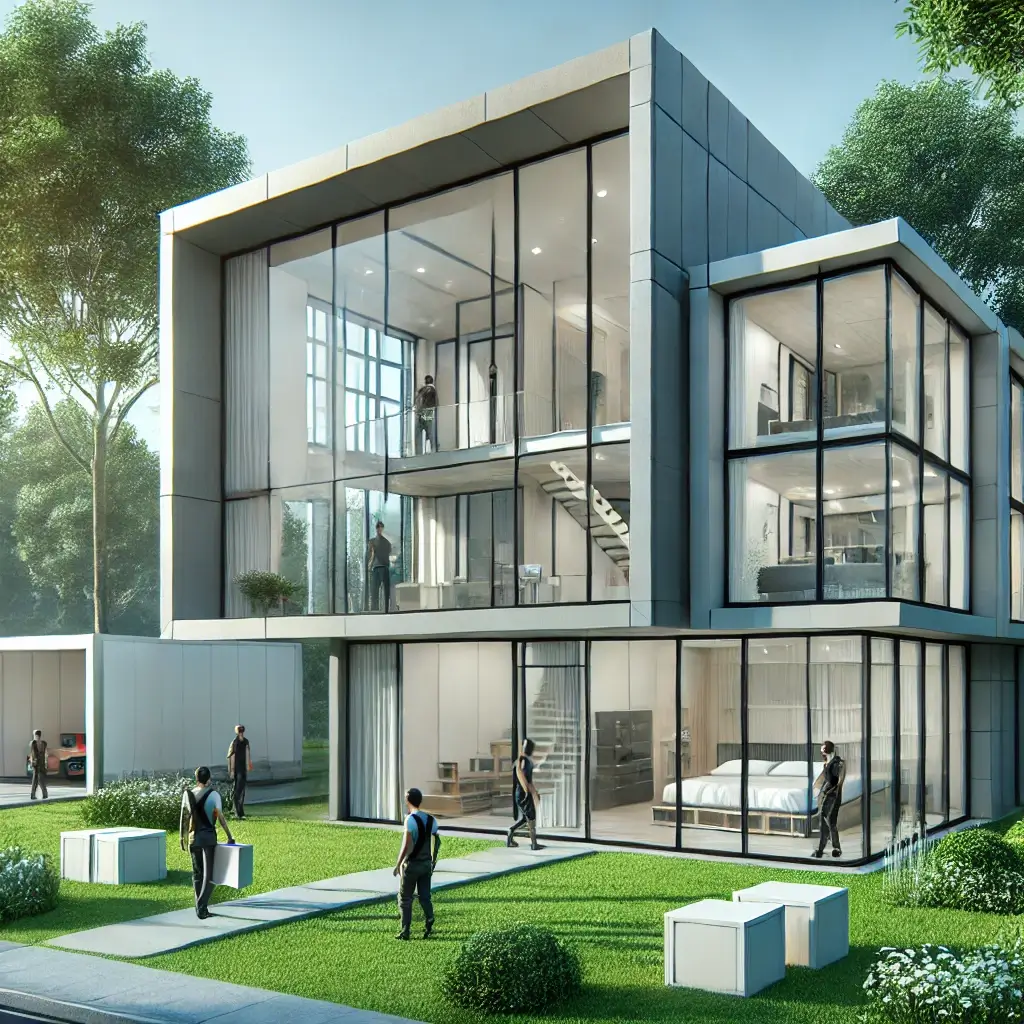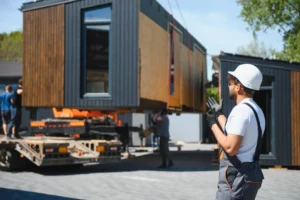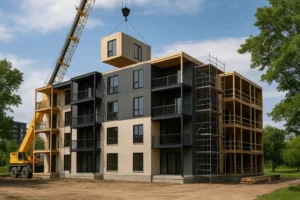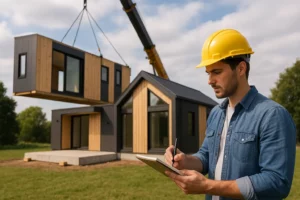Self-construction is attracting more and more Quebecers looking to build their dream home. Among the available options, prefabricated (or manufactured) homes are proving to be a wise choice thanks to their speed, quality, and flexibility.
Why do so many self-builders opt for a pre-built home?
Discover in this article the 7 Key Benefits of Prefabricated Homes and why they are ideal for your self-build project.
Explore our available models now and find the one that perfectly suits your needs: Filter models.
1. A considerable saving of time
Prefabricated homes are designed to maximize efficiency and reduce the time often associated with traditional construction projects. This time saving is due to several factors:
Controlled environment manufacturing
Unlike traditional constructions carried out entirely on site, prefabricated houses are manufactured in specialized factories where conditions are optimal:
- No interruption due to bad weather (rain, snow, frost, or heatwave).
- A standardized and well-established process allowing modules to be manufactured quickly and accurately.
Work in parallel with the preparation of the ground
While the house modules are manufactured in the factory, site work can proceed simultaneously: ground preparation, foundations, and utility connections. This simultaneity significantly reduces the overall project duration.
Fast and efficient assembly on site
Once the modules are ready, they are transported to the construction site for assembly in just a few days. This process reduces the time workers spend on site and limits disruption to neighbors.
Minimizing unforeseen delays
In traditional construction, delays are common, whether due to weather, coordination issues between subcontractors, or material shortages. With a prefabricated home:
- Most of the unforeseen events are eliminated through better planning and total control over the production process.
- Materials are planned and prepared in advance, reducing the risk of shortages.
A globally accelerated project
On average, a prefabricated home can be ready for occupancy within a few weeks of site preparation, while a traditional build can take 6 to 12 months or more. This time saving allows self-builders to move in quickly and avoid additional costs such as prolonged rental of temporary accommodation.
Concrete example:
For a standard prefabricated home, it's common for modules to be factory-built in 6 to 8 weeks. Once the foundations are ready, delivery and on-site assembly typically take less than 10 days. Comparatively, a traditional project could take 4 to 6 months just to reach the same milestone.
A strategic advantage
This time saving isn't just practical; it can also be strategic, especially in a high-demand real estate market. Homeowners can enjoy their new home sooner, which is particularly beneficial in contexts where prices are rising rapidly.
In short, choosing a prefabricated home not only saves considerable time, but also avoids the frustrations of unforeseen delays. This is a major advantage for any self-builder looking to optimize their project.
2. Better cost control
3. Uniform and certified quality
Prefabricated homes are distinguished by their exceptional level of quality, thanks to highly standardized and rigorously controlled manufacturing processes. This process guarantees superior uniformity and durability, meeting the expectations of demanding self-builders.
Manufacturing in a controlled environment
The construction of prefabricated houses takes place in specialized factories, where working conditions are optimized to guarantee a high-quality final product.
- The modules are manufactured with industrial precision tools, which reduces human errors often observed on traditional construction sites.
- The environmental conditions (temperature, humidity) are perfectly controlled, which allows the optimal use of materials.
Compliance with rigorous standards
Manufactured home manufacturers work to strict standards, often certified by independent regulatory or inspection bodies. This ensures:
- Compliance with local building codes.
- A robust and durable structure, capable of withstanding the harsh Quebec climate.
Some manufacturers even go beyond the minimum requirements, by integrating environmental certifications or eco-responsible materials.
Materials protected from the weather
One of the major advantages of factory manufacturing is the complete protection of materials from the elements. Unlike traditional construction, where materials may be exposed to rain, snow, or moisture:
- Panels, beams and other components remain intact, with no deterioration due to weathering.
- This prevents future problems such as mold, wood swelling or premature deterioration.
Example : A factory-made frame is perfectly dry during assembly, unlike one exposed on a construction site where bad weather can compromise its solidity.
Precision in assembly
Each part of a prefabricated house is cut and manufactured with millimeter precision, thanks to state-of-the-art equipment. This precision guarantees:
- Quick assembly without costly adjustments.
- An impeccable finish, whether for joints, walls or openings.
Quality controls at every stage
At the factory, each step of the manufacturing process is inspected by qualified experts to ensure that the components meet the defined standards. This continuous monitoring:
- Reduces the risk of costly mistakes.
- Provides peace of mind to self-builders, knowing their home meets high standards from the start.
Adapted to the Quebec climate
Manufactured homes are designed to meet the specific challenges of Quebec, including:
- Optimized thermal and sound insulation for harsh winters.
- Reinforced structures to support heavy snow loads.
A safe and sustainable investment
By choosing a prefabricated home, you're opting for a construction where every component is crafted with care and precision. Thanks to rigorous standards, protected materials, and consistent quality control, you benefit from a solid, durable, and high-quality home. This level of consistency and certification makes all the difference, especially for a self-build project.
4. Flexibility in customization
Contrary to the myth that prefabricated homes are limited to standard designs, they now offer a great deal of customization. Modern manufacturers allow self-builders to create a home tailored to their needs, lifestyle, and preferences, while still enjoying the benefits of factory construction.
Choice of architectural style
Manufactured homes come in a variety of styles to suit everyone's tastes:
- Modern : Clean lines, large windows, and a minimalist aesthetic.
- Classic : Timeless designs that fit into any environment.
- Rustic : Perfect for chalets or country houses, with natural materials like wood.
- Contemporary : A balance between tradition and modernity, with open and bright spaces.
Manufacturers often offer a catalog of basic models that you can further customize according to your preferences.
Modification of structural characteristics
In addition to choosing an architectural style, self-builders can adjust key elements of their home:
- Add or remove one garage, a mezzanine or a veranda.
- Change the number of bedrooms or bathrooms to suit the family's needs.
- Reorganize interior spaces to maximize functionality and comfort.
Example: If you work from home, you could incorporate a bright office with a panoramic window to take advantage of natural light.
Selection of materials and finishes
Personalization also extends to materials and aesthetic details:
- Exterior coverings: Choose between wood, brick, vinyl or composite panels.
- Floors and surfaces: Choose parquet, tiles or more ecological materials.
- Colors: Select shades that reflect your personality, both inside and out.
- Equipment: Integrate modern options like energy-efficient windows, home automation systems or underfloor heating.
Adaptation to your terrain
Manufactured homes are also designed to adapt to the specific characteristics of your land:
- Include custom foundations for sloping or hard-to-reach terrain.
- Maximize views or sun exposure through strategic arrangement of windows and living spaces.
Technological and ecological options
Many manufacturers offer solutions adapted to modern needs:
- Home automation: Integrate smart systems to control lighting, heating or security remotely.
- Eco-construction: Choose sustainable materials, solar panels, or rainwater harvesting systems to reduce your ecological footprint.
A collaborative experience
Manufactured home manufacturers often work with their clients to design a completely customized plan:
- Meetings with architects or designers allow you to fine-tune every detail.
- Some manufacturers even offer online tools to visualize and modify your home design before manufacturing.
A house that suits you
With a pre-built home, you don't have to sacrifice your desires or style. Customization options cover everything from the overall design to the smallest details, allowing you to build a unique home that perfectly meets your needs and reflects your vision. It's an ideal solution for self-builders who want to combine practicality and creativity.
5. Reduced environmental impact
For self-builders concerned about their environmental footprint, prefabricated homes represent a particularly advantageous solution. Thanks to optimized manufacturing and construction processes, they minimize the environmental impact compared to traditional methods.
Less waste of materials
Factory-built construction is precisely planned and executed, significantly reducing waste. Unlike traditional construction sites where excess materials or cutting errors can lead to significant waste, manufactured homes benefit from:
- Optimization of cuts and assemblies: The modules are manufactured with precision equipment, which maximizes the use of materials.
- Waste management: Leftover materials are recycled or reused directly in the factory.
Result: A significant reduction in construction waste, which often represents a large portion of the debris sent to landfills.
Reducing carbon footprint
Prefabricated homes require less transportation of materials to the construction site. In traditional construction, frequent material deliveries and the use of heavy equipment contribute to a high carbon footprint. With a prefabricated home:
- The materials are transported in one go to the factory, where they are processed.
- The prefabricated modules are then transported in one or two deliveries to the construction site, reducing the number of journeys required.
This limits the impact of CO2 emissions linked to transport.
Controlled production conditions
Factory production also reduces energy consumption compared to on-site construction:
- No energy consumption to heat or protect materials from the weather.
- Use of high-performance industrial equipment that consumes less energy than manual tools used on construction sites.
Use of sustainable and eco-responsible materials
Many prefabricated home manufacturers favor environmentally friendly materials:
- FSC (Forest Stewardship Council) certified wood, sourced from sustainably managed forests.
- Ecological insulation, such as wood fiber or hemp.
- Paints and finishes without volatile organic compounds (VOCs), reducing the impact on air quality.
Design for better energy efficiency
Manufactured homes are often designed to be more energy efficient through advanced techniques:
- Superior insulation: Factory-made panels and modules are better insulated, reducing heating and cooling needs.
- Reduction of thermal bridges: Precise construction helps limit energy loss through walls and openings.
- Possibility of integrating renewable energies: Manufacturers often offer options such as installing solar panels or rainwater harvesting systems.
Extended lifespan
A well-designed manufactured home made with sustainable materials has a longer lifespan, which reduces the long-term ecological impact:
- Fewer renovations or repairs required.
- Better resistance to weather and climate change, which limits the resources needed for maintenance.
An ecological and responsible choice
By choosing a prefabricated home, you help reduce the environmental impact of your self-build project while benefiting from a sustainable and efficient solution.
From waste reduction to improved energy efficiency, this type of construction fits perfectly with an eco-responsible approach. It's an ideal choice for self-builders looking to combine comfort, modernity, and respect for the environment.
6. A turnkey solution for self-builders
Prefabricated homes offer the perfect balance between simplicity and flexibility, making them an ideal turnkey solution for self-builders.
They allow you to benefit from a structure that is already ready to assemble while leaving the possibility of investing in certain stages of the project according to your skills and desires.
A ready-to-assemble product
Prefabricated homes are delivered as prefabricated modules or panels, already designed to fit together perfectly. This means that:
- The main elements (walls, floors, roofs) are already manufactured, considerably reducing the work to be done on site.
- The assembly plans are detailed and provided, making assembly easy even for self-builders with little construction experience.
- On-site assembly is fast and generally requires less coordination between different trades, simplifying overall project management.
Freedom to manage certain steps
For self-builders who want to be directly involved in their project, prefabricated homes offer unparalleled flexibility. You can choose to manage:
- Preparing the ground: Excavation, foundations or connections to services.
- Interior finishes: Installation of floor coverings, painting, installation of cabinets and light fixtures.
- Exterior fittings: Terrace, garden, paths, etc.
This personal involvement can help reduce costs while providing the added satisfaction of seeing your vision take shape.
Support from manufacturers
Although pre-built homes are ready to assemble, manufacturers often offer support to guide self-builders:
- Technical support: Telephone or online support to answer questions during the assembly process.
- Partial or full installation options: If some aspects seem too complex for you, you can entrust specific tasks to a team of experts.
- Training or demonstration: Some manufacturers offer demonstrations or short training sessions to help self-builders familiarize themselves with assembly.
Less coordination required
In a traditional construction, the self-builder often has to juggle several teams: architects, masons, carpenters, plumbers, etc. With a factory-built house:
- The structure is already designed and manufactured, which eliminates delays related to coordination between different stakeholders.
- The plans provided incorporate all necessary details, reducing errors in interpretation or implementation.
A solution adaptable to your needs
Prefabricated homes are perfectly suited to your level of involvement and skills:
- If you prefer a turnkey project, the manufacturers can take care of the complete assembly.
- If you want to be more involved, you can take charge of the steps you are comfortable with, such as finishing touches or landscaping.
A simplified, but personalized project
Thanks to the turnkey solution offered by manufactured homes, you have:
- Increased control on the steps you want to manage yourself.
- Peace of mind on technical and structural aspects, supported by experts.
- A personalized project where you can add your personal touch without compromising quality or deadlines.
An ideal solution for modern self-builders
With a pre-built home, you combine the best of both worlds: the ease and speed of a turnkey product, and the satisfaction of actively contributing to the construction of your home.
Whether you're a novice or an experienced DIYer, this type of construction adapts to your needs, simplifying the process while ensuring a professional result.
7. Peace of mind thanks to guarantees
One of the greatest advantages of pre-built homes is the robust warranties they come with. These warranties provide essential protection for self-builders, ensuring peace of mind throughout their project and beyond.
A guarantee of solid structure
The structure of a manufactured home is designed to meet strict standards, and this reliability is reinforced by a structural warranty:
- Manufacturers generally guarantee the strength of the foundations, load-bearing walls and the frame.
- These guarantees cover construction defects or hidden defects that may affect the stability or durability of the house.
This means that even if something unexpected happens, you are protected and can get repairs at no extra cost.
Warranty on materials
The materials used in the manufacture of prefabricated homes also benefit from specific guarantees:
- Exterior coverings: Lifespan and resistance to bad weather.
- Windows and doors: Waterproofing and insulation.
- Electrical and plumbing systems: Compliance with safety standards and proper functioning.
These warranties give you the confidence that your home is built with top-quality components, and that if they are defective, they will be replaced or repaired at no additional cost.
Protection offered by the New Residential Building Guarantee Plan (GCR)
In Quebec, the New Residential Building Guarantee Plan (GCR) is a legal requirement for new residential buildings. Prefabricated homes benefit from it, offering you even more comprehensive protection:
- Refund of deposit: If the manufacturer does not respect its commitment, your initial deposit is protected.
- Repairs and finishing: Warranty covering defects or omissions noted after delivery.
- 5-year warranty on major defects: Protecting against any problem compromising the solidity or security of the house.
A solution to anticipate the future
The warranties associated with prefabricated homes are not limited to the initial construction. They offer long-term protection:
- You are covered against manufacturing defects even years after installation.
- If the house is resold, these guarantees can be transferred to the new owners, thus increasing the perceived value of your property.
Responsive after-sales service
Manufactured home manufacturers typically have a dedicated after-sales service department to quickly resolve any potential issues. This includes:
- Regular inspections during the warranty period.
- Technical support for maintenance or repairs.
Concrete example of coverage
Let's take a manufactured home with a 10-year warranty:
- 1st year: Minor repairs or missed finishes (e.g., door or window adjustments).
- Up to 5 years: Functional defects or hidden defects (plumbing, minor cracks in the structure).
- Up to 10 years: Major structural problems that may affect the safety of the home.
Unparalleled peace of mind
The guarantees associated with pre-built homes are not just a marketing ploy: they constitute real insurance for self-builders.
They allow you to approach the project with confidence, knowing that you are protected against unforeseen events. This level of security, rarely matched in traditional construction, is another key advantage that makes manufactured homes particularly attractive.
Conclusion
Choosing a prefabricated home for your self-build project means opting for a fast, cost-effective, and high-quality solution. This type of home combines the advantages of modern construction with the flexibility needed to meet your specific needs.
Whether you're a beginner or an experienced self-builder, prefabricated homes allow you to realize your dream of building a home that reflects your personality, while controlling costs and respecting the environment.
Would you like to explore the manufactured home models available in Quebec? Check out our search tool to find the one that perfectly matches your needs: Filter models.




